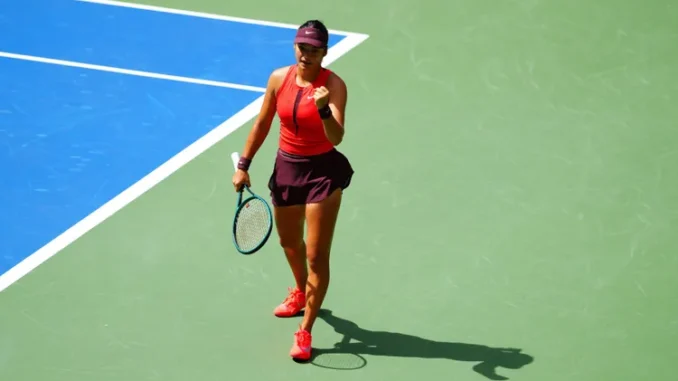
Under the vibrant floodlights of Beijing’s National Tennis Center, Emma Raducanu stepped onto the court for her eagerly anticipated China Open debut, her racket an extension of a deeper connection to the land of her maternal heritage. The 22-year-old British star, seeded 30th and ranked No. 31 globally, faced a formidable challenge in Spain’s unseeded Cristina Bucsa, ranked No. 62. Yet, in a display of poise and power, Raducanu clinched a 6-3, 6-3 victory in just 97 minutes, marking not only a professional milestone but a poignant homecoming. This wasn’t merely another win—it was a testament to her resilience after a stinging defeat the previous week and a celebration of her roots in a city that resonates with her family’s story.
The road to this moment was paved with trials. Just a week prior at the Korea Open, Raducanu had faltered, letting three match points slip in a gut-wrenching quarterfinal loss to Barbora Krejcikova. The defeat lingered, a sharp reminder of the fine margins in elite tennis, but Beijing offered a chance to rewrite the narrative. With her mother, Renee Zhai, watching from the stands—a rare and meaningful presence—Raducanu transformed frustration into focus. Zhai’s Chinese heritage has long been a cornerstone of her daughter’s identity, woven into a childhood spent speaking Mandarin alongside English and picking up Romanian phrases during family visits. Born in Toronto to a Chinese mother and Romanian father before settling in England at age two, Raducanu carries a multicultural legacy that’s as dynamic as her forehand. On this cool October evening, that heritage fueled a performance that felt like a love letter to her mother’s homeland.
The match itself was a showcase of mental steel and athletic artistry. Bucsa came out swinging, her aggressive baseline game producing 28 winners to Raducanu’s 16, testing the Briton from the first game with four break-point chances. The Spaniard’s relentless groundstrokes pushed Raducanu into a defensive crouch early, but the former US Open champion responded with trademark grit. Saving seven of eight break points, she unleashed five aces with whip-like precision, converting 71% of her first serves and 50% of her second. The turning point came at 3-3 in the first set, when Raducanu rattled off five consecutive games, breaking Bucsa’s serve with a mix of pinpoint serves and daring net play. The second set saw a brief fightback—Bucsa leveled at 2-2 after Raducanu missed a chance to lead 3-0—but the Briton roared back, breaking again and closing out the match with a forehand that clipped the line, a shot as decisive as it was poetic.
As the Beijing crowd erupted, Raducanu’s post-match interview became a moment of magic. In English, she reflected humbly: “Cristina was playing amazing… so I’m very happy to have gotten over it.” Then, in a seamless switch to Mandarin, she electrified the stands: “I’m going to do my best, I really want to do well here. I’m half-Chinese, so it’s great to come back here.” The arena exploded—fans waving flags in tribute to her heritage roared as her words bridged cultures, turning a routine interview into a cultural milestone. Her fluency, nurtured through childhood chats with her mother, wasn’t just a flex; it was a heartfelt nod to a tournament that feels like family. The crowd’s reaction—gasps melting into cheers—underscored the weight of the moment, as Raducanu emerged not just as a tennis prodigy but as a global connector.
This victory stretched her streak of opening-round wins to 14 tournaments, a quiet marker of consistency for a player who’s weathered injuries, coaching shifts, and the glare of expectation since her 2021 US Open fairy tale. Her record against Bucsa now stands at 2-1, having overcome an earlier loss in Singapore, and her 14-3 tally against sub-top-50 players in 2025 speaks to her blend of strategy and strength. But Beijing is more than stats—it’s personal. “After a tough one last week, to come back and bounce back—I’m very happy,” she said, her voice crackling with ambition. That fire now fuels her third-round clash with No. 4 seed Jessica Pegula, a baseline titan who leads their head-to-head 2-1, their last duel a 2022 three-set epic. Pegula’s biting serve and neutralizing returns will challenge Raducanu’s versatility, but if her debut proved anything, it’s that she thrives when the stakes carry personal weight.
The British contingent added to the buzz, with Sonay Kartal storming into the third round via a 6-4, 6-2 upset of former top-10 star Daria Kasatkina. Kartal’s breakout summer, capped by a WTA 125 title, signals a rising UK tide in Asia. Yet, the spotlight remains on Raducanu, whose Beijing journey intertwines high-stakes tennis with a homecoming’s heart. With her mother watching and a nation’s hopes subtly aligned, her Mandarin vow echoes: she really wants to do well here. As she eyes Pegula and beyond, Beijing might just be the stage for her next great chapter—a story written in grit, grace, and the pull of heritage.
Leave a Reply